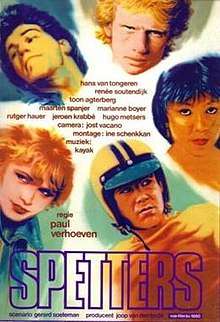Spetters
Spetters (English translation: Splashes) is a Dutch film released in 1980 and directed by Paul Verhoeven.[1] The film follows the lives of three young men who have little in common but their love for dirt-bike racing. Set on the outskirts of Rotterdam, the film depicts three characters who are hoping to escape a dead-end, working-class existence.
| Spetters | |
|---|---|
 Dutch film poster for Spetters | |
| Directed by | Paul Verhoeven |
| Produced by | Joop van den Ende |
| Written by | Gerard Soeteman Jan Wolkers (uncredited) |
| Starring | Hans van Tongeren Renée Soutendijk Toon Agterberg Maarten Spanjer Marianne Boyer Jeroen Krabbé Rutger Hauer |
| Music by | Ton Scherpenzeel Kayak |
| Cinematography | Jost Vacano |
| Edited by | Ine Schenkkan |
Release date |
|
Running time | 120 minutes |
| Country | Netherlands |
| Language | Dutch |
Each of the boys are seduced by a young woman who, with her brother, sells French fries and hot dogs at the races. She is looking for the person who will help her get out of the business and away from her brother. The motocross racers want to make their marks as professional racers, but their hopes don't go according to their plans.
Spetters led to protests about how Verhoeven portrayed gays,[2] Christians, the police, and the press. Although Verhoeven made one more film in the Netherlands, the response to Spetters led him to leave for Hollywood. Despite the large amount of controversy surrounding it,[2] the film proved to be popular,[3] with 1,124,162 admissions in the Netherlands alone.
The film was a small success in the United States, and it helped launch the Hollywood careers of Verhoeven and some of the actors, including Jeroen Krabbé, Rutger Hauer and Renee Soutendijk.[4]
Plot
Two young motocross racers, Rien (Hans van Tongeren) and Hans (Maarten Spanjer), and their mechanic, Eef (Toon Agterberg), dream of fame, fortune and loose women. Their hero is legendary motocross champion Gerrit Witkamp (Rutger Hauer), who fuels their competitive drives. The lives of the racers are changed when they meet a young seductress named Fientje (Renée Soutendijk). Eventually, she makes the three men face the reality of success, defeat and homosexuality.
Cast
- Hans van Tongeren as Rien
- Renée Soutendijk as Fientje
- Toon Agterberg as Eef
- Maarten Spanjer as Hans
- Marianne Boyer as Maya
- Peter Tuinman as Jaap
- Saskia van Basten-Batenburg (credited as Saskia Ten Batenburg) as Truus
- Yvonne Valkenburg as Annette
- Ab Abspoel (credited as Albert Abspoel) as Rien's father
- Rudi Falkenhagen as Hans' father
- Hans Veerman as Eef's father
- Ben Aerden as elderly homosexual
- Kitty Courbois as Doctor
- Margot Keune as girl on moped
- Jonna Koster as Gerrit's wife
- Gees Linnebank as homosexual
- Hugo Metsers as a Hell's Angel
- Peter Oosthoek as Priest
- Jeroen Krabbé as Frans Henkhof
- Rutger Hauer as Gerrit Witkamp
- Bruni Heinke as mother in car
- Herman Vinck as driver
Title
"Spetter" (plural: "spetters") means 'good looking boy or girl', comparable to the American hunk and babe. It also means "splatters" and thereby refers to dirt splattering up while motorcrossing as well as the oil splattering when Soutendijk's character lowers the chips into the frying pan at the chips stall where she works.
Film rating
- The film is classified as R18 in New Zealand.
References
- The New York Times
- Chen, Nick (7 March 2017). "Six of Paul Verhoeven's most controversial moments". lwlies.com. Retrieved 14 July 2018.
- Smith, Adam; Williams, Owen (31 August 2016). "Triple Dutch: Paul Verhoeven's sci-fi trilogy". empireonline.com. Retrieved 14 July 2018.
- Dutch Centre for international cultural activities website: Dutch cinema: less sex and violence Archived 2010-09-19 at the Wayback Machine, published 2008, visited 9 October 2010
External links
- Spetters on IMDb
- Spetters at AllMovie
- Spetters at Rotten Tomatoes
- Symbolic Power and Religious Impotence in Paul Verhoeven’s Spetters in Journal of Religion and Film, October 2003